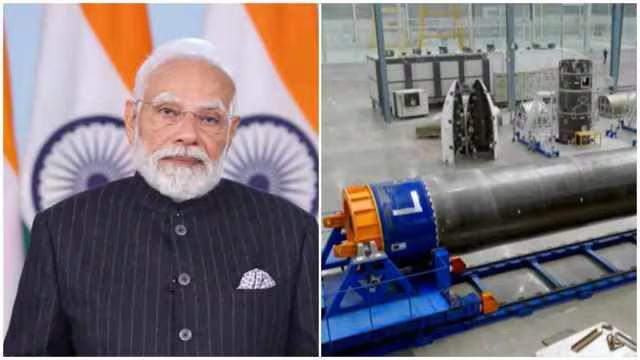
PM Modi Unveils Vikram-1, India’s First Privately Developed Orbital Rocket
In a historic moment for India’s space sector, Prime Minister Narendra Modi on Thursday inaugurated the Infinity Campus of space startup Skyroot Aerospace via video conferencing. The ceremony also marked the unveiling of Vikram-1, India’s first privately developed orbital rocket. The Prime Minister hailed the achievement as a “significant leap forward” for the country’s space industry, highlighting the immense potential of private players in driving innovation and growth.
The Infinity Campus, located in Hyderabad, is a state-of-the-art facility that will serve as the hub for Skyroot Aerospace’s rocket manufacturing operations. According to Pawan Chandana, the founder of Skyroot Aerospace, the campus is designed to produce one rocket every month, demonstrating the company’s ambitious plans to cater to the growing demand for launch services in the country. This capability will not only enable Skyroot to meet the needs of Indian space agencies but also position the company as a competitive player in the global launch market.
The unveiling of Vikram-1, named after the renowned Indian scientist and space pioneer Vikram Sarabhai, marks a significant milestone in India’s space journey. As the country’s first privately developed orbital rocket, Vikram-1 represents a major breakthrough in the development of indigenous launch capabilities. The rocket is designed to carry small satellites into space, catering to the burgeoning demand for launch services from startups, universities, and research institutions.
Prime Minister Modi’s presence at the inauguration ceremony underscores the government’s commitment to supporting the growth of the private space industry in India. The government has been actively promoting the development of the space sector through various initiatives, including the establishment of the Indian National Space Promotion and Authorisation Centre (IN–SPACe). This agency is responsible for regulating and facilitating the activities of private space companies, enabling them to contribute to the country’s space program.
The development of Vikram-1 is a testament to the capabilities of Indian space startups, which have been gaining momentum in recent years. Skyroot Aerospace, founded in 2018, has been at the forefront of this movement, with a focus on developing cutting-edge launch technologies. The company’s achievements have been recognized globally, with Vikram-1 being hailed as a major breakthrough in the development of private launch capabilities.
The implications of this achievement are far-reaching, with the potential to transform India’s space industry. The success of Vikram-1 will not only demonstrate the capabilities of Indian space startups but also pave the way for further innovation and investment in the sector. As the country continues to push the boundaries of space exploration and development, the role of private players is expected to become increasingly important.
The Infinity Campus, with its state-of-the-art infrastructure and production capabilities, is poised to play a critical role in driving the growth of India’s space industry. With the ability to produce one rocket every month, Skyroot Aerospace is well-positioned to cater to the growing demand for launch services, both domestically and internationally. The company’s plans to expand its operations and develop new launch technologies will further cement India’s position as a major player in the global space industry.
In conclusion, the unveiling of Vikram-1, India’s first privately developed orbital rocket, marks a significant milestone in the country’s space journey. The achievement is a testament to the capabilities of Indian space startups and the government’s commitment to supporting the growth of the private space industry. As the country continues to push the boundaries of space exploration and development, the role of private players is expected to become increasingly important. With the Infinity Campus and Vikram-1, Skyroot Aerospace is poised to play a leading role in driving the growth of India’s space industry, and the country is expected to emerge as a major player in the global space market.





